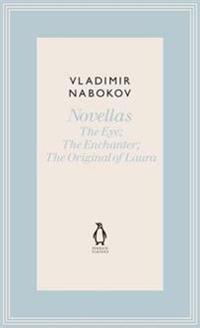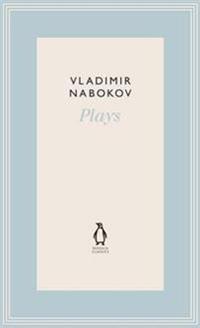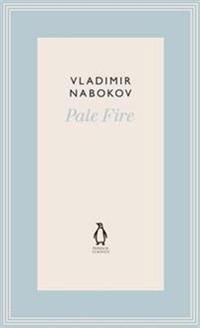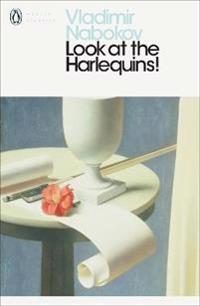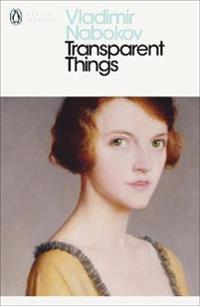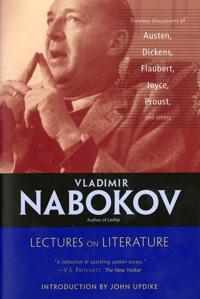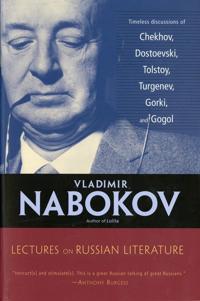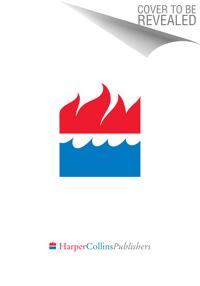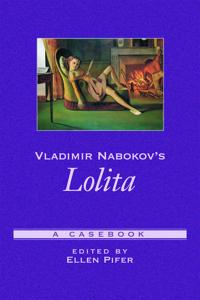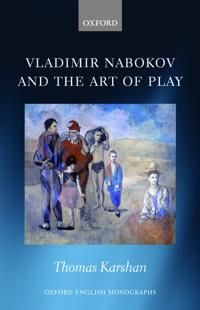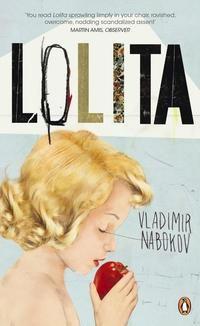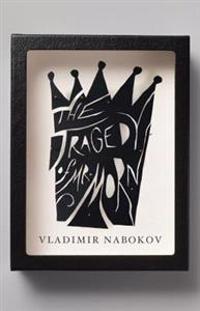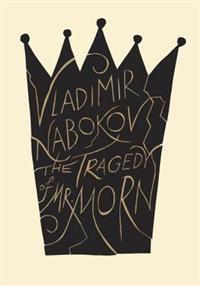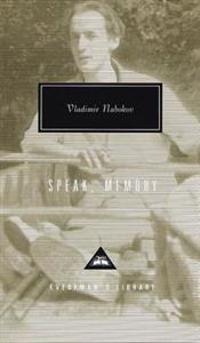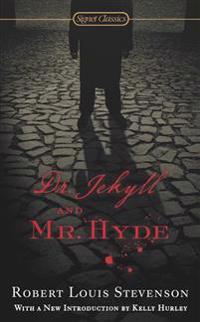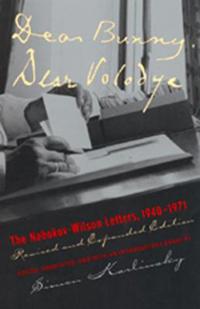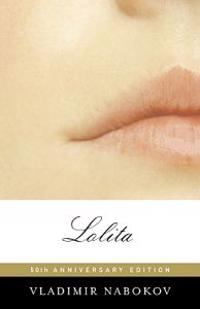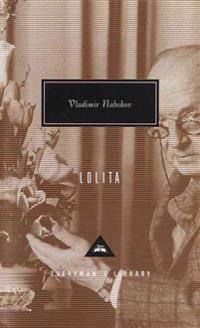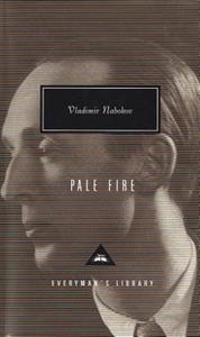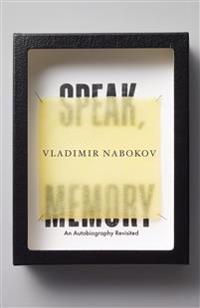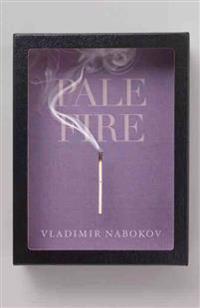Novellas (Inbunden)
avVladimir Nabokov
ISBN: 9780141197203 - UTGIVEN: 2012-09In "The Eye", a fussily self-conscious Russian tutor shoots himself after a humiliating beating by his mistress' husband. There follows a satirical detective story and a wonderfully layered exploration of identity, appearance and the loss of self in a world of word-play and confusion. Nabokov descri[...]
Plays (Inbunden)
avVladimir Nabokov
ISBN: 9780141197210 - UTGIVEN: 201209Nabokov's rapturous masterpiece of erotic obsession entered the common consciousness and inspired two films. It also inspired Nabokov himself to try his hand at screenwriting, and the result was this typically graceful and ingenious screenplay, which he wrote in 1960. "Lolita: A Screenplay" gleefull[...]
Pale Fire (Inbunden)
avVladimir Nabokov
ISBN: 9780141197241 - UTGIVEN: 201209The American poet John Shade is dead; murdered. His last poem, "Pale Fire", is put into a book, together with a preface, a lengthy commentary and notes by Shade's editor, Charles Kinbote. Known on campus as the 'Great Beaver', Kinbote is haughty, inquisitive, intolerant, but is he also mad, bad - an[...]
Look at the Harlequins! (Häftad)
avVladimir Nabokov
ISBN: 9780141198033 - UTGIVEN: 2011-02'Look at the harlequins ...Play! Invent the world! Invent reality'. This is the childhood advice given by an aunt to Russian born writer Vadim Vadimovich, who emigrates to England, then Paris, then Germany and then the US, and, now dying, reconstructs his past. He remembers Iris his first wife, Anne[...]
Transparent Things (Häftad)
avVladimir Nabokov
ISBN: 9780141198040 - UTGIVEN: 201102The darkly comic "Transparent Things", one of Nabokov's final books, traces the bleak life of Hugh Person through murder, madness, prison and trips to Switzerland. One of these was the last journey his father ever took; on another, having been sent to ingratiate himself with a distinguished novelist[...]
Lectures on Literature (Häftad)
avVladimir Nabokov, Fredson Bowers
ISBN: 9780156027755 - UTGIVEN: 200212Lectures on Russian Literature (Häftad)
avVladimir Nabokov, Fredson Bowers
ISBN: 9780156027762 - UTGIVEN: 200212Lectures on Don Quixote (Häftad)
avVladimir Nabokov, Fredson Bowers, Fredson Bowers
ISBN: 9780156495400 - UTGIVEN: 1984-04A fastidiously shaped series of lectures based on a chapter-by-chapter synopsis of the Spanish classic. Rejecting the common interpretation of Don Quixote as a warm satire, Nabokov perceives the work as a catalog of cruelty through which the gaunt knight passes. Edited and with a Preface by Fredson [...]
Vladimir Nabokov's Lolita (Pocket)
avEllen (EDT) Pifer
ISBN: 9780195150339 - UTGIVEN: 2002-11Midway through last century, Lolita burst on the literary scene-a Russian exile's extraordinary gift to American letters and the New World. The scandal provoked by the novel's subject-the sexual passion of a middle-aged European for a twelve-year-old American girl-was quickly upstaged by the critica[...]
Vladimir Nabokov and the Art of Play (Inbunden)
avThomas Karshan
ISBN: 9780199603985 - UTGIVEN: 201101In a speech given in December 1925, Vladimir Nabokov declared that 'everything in the world plays', including 'love, nature, the arts, and domestic puns.' All of Nabokov's novels contain scenes of games: chess, scrabble, cards, football, croquet, tennis, and boxing, the play of light and the play of[...]
Vladimir Nabokov (Inbunden)
avDavid Rampton
ISBN: 9780230247239 - UTGIVEN: 2012-12-24A clearly written, insightful study of Nabokov the novelist, providing an expert analysis of the 17 novels he wrote during a career spanning more than 50 years: one of the most impressive, challenging, and controversial literary achievements of our time.[...]
Lolita (Pocket)
avVladimir Nabokov
ISBN: 9780241951644 - UTGIVEN: 201104"Lolita, light of my life, fire of my loins. My sin, my soul. Lo-lee-ta: the tip of my tongue taking a trip of three steps down the palate to tap, at three, on the teeth. Lo. Lee. Ta."
Humbert Humbert is a middle-aged, frustrated college professor. In love with his landlady's twelve-year[...]Lolita (Häftad)
avVladimir Nabokov
ISBN: 9780241953242 - UTGIVEN: 2011-08Vladimir Nabokov's "Lolita" is one of the best-known novels of the 20th century: the controversial story of Humbert Humbert who falls in love with twelve year old Lolita, beautifully repackaged as part of the Penguin Essentials range. 'Lolita, light of my life, fire of my loins. My sin, my soul. Lo-[...]
The Original of Laura (Pocket)
avVladimir Nabokov
ISBN: 9780307472854 - UTGIVEN: 2012-12-11A landmark publication of the literary master's unfinished final work is a fragmented draft as hand-written on 138 index cards that were originally requested for destruction and have been released by his son.[...]
The Tragedy of Mr. Morn (Häftad)
avVladimir Nabokov
ISBN: 9780307950666 - UTGIVEN: 2013-12Vladimir Nabokov's earliest major work, written when he was twenty-four, is a full-length play in verse of Shakespearean beauty and richness.
The story of an incognito king whose love for the wife of a banished revolutionary brings on the chaos the king has fought to prevent, this five-act play [...]The Tragedy of Mister Morn (Inbunden)
avVladimir Nabokov
ISBN: 9780307960818 - UTGIVEN: 201303For the first time in English, Vladimir Nabokov's earliest major work, written when he was only twenty-four: his only full-length play, introduced by Thomas Karshan and beautifully translated by Karshan and Anastasia Tolstoy.
"The Tragedy of Mister Morn" was written in the winter of 1923---1924,[...]Speak, Memory: An Autobiography Revisited (Inbunden)
avVladimir Nabokov, Brian Boyd
ISBN: 9780375405532 - UTGIVEN: 199903From one of the 20th century's great writers comes one of the finest autobiographies of our time. "Speak, Memory" was first published by Vladimir Nabokov in 1951 as "Conclusive Evidence" and then assiduously revised and republished in 1966. The Everyman's Library edition includes, for the first time[...]
Dr. Jekyll and Mr. Hyde (Pocket)
avRobert Louis Stevenson, Vladimir Nabokov, Dan Chaon
ISBN: 9780451532251 - UTGIVEN: 201212""Why did you wake me? I was dreaming a fine bogey tale."" Robert Louis Stevenson's masterpiece of the duality of good and evil in man's nature sprang from the darkest recesses of his own unconscious--during a nightmare from which his wife awakened him, alerted by his screams. More than a hundred ye[...]
Dear Bunny, Dear Volodya (Häftad)
avVladimir Nabokov, Edmund Wilson
ISBN: 9780520220805 - UTGIVEN: 200104Simon Karlinsky has substantially expanded and revised the first edition of Vladimir Nabokov and Edmund Wilson's correspondence to include fifty-nine letters discovered subsequent to the book's original publication in 1979. Since then, five volumes of Edmund Wilson's diaries have been published, as [...]
Lolita (Inbunden)
avVladimir Nabokov, Martin Amis
ISBN: 9780679410430 - UTGIVEN: 199303When it was published in 1955, "Lolita" immediately became a cause celebre because of the freedom and sophistication with which it handled the unusual erotic predilections of its protagonist. But Vladimir Nabokov's wise, ironic, elegant masterpiece owes its stature as one of the twentieth century's [...]
Pale Fire (Inbunden)
avVladimir Nabokov, Richard Rorty
ISBN: 9780679410775 - UTGIVEN: 199203The urbane authority that Vladimir Nabokov brought to every word he ever wrote, and the ironic amusement he cultivated in response to being uprooted and politically exiled twice in his life, never found fuller expression than in "Pale Fire" published in 1962 after the critical and popular success of[...]
Speak, Memory: An Autobiography Revisited (Häftad)
avVladimir Nabokov
ISBN: 9780679723394 - UTGIVEN: 198908Speak, Memory, first published in 1951 as Conclusive Evidence and then assiduously revised in 1966, is an elegant and rich evocation of Nabokov's life and times, even as it offers incisive insights into his major works, including Lolita, Pnin, Despair, The Gift, The Real Life of Sebastian Knight, an[...]
Pale Fire (Häftad)
avVladimir Nabokov
ISBN: 9780679723424 - UTGIVEN: 198904In Pale Fire Nabokov offers a cornucopia of deceptive pleasures: a 999-line poem by the reclusive genius John Shade; an adoring foreword and commentary by Shade's self-styled Boswell, Dr. Charles Kinbote; a darkly comic novel of suspense, literary idolatry and one-upmanship, and political intrigue. [...]

